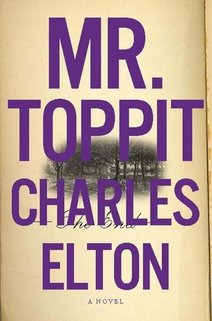
12 Nov 2010 01:08:15
Luke Hayman, the protagonist of Charles Elton's "Mr. Toppit," similarly feels the burden of "empty fame." Luke's father, Arthur, writes a series of children's books called "The Hayseed Chronicles," using both Luke's experiences and name. Their worldwide popularity, spawning adaptations, games and various baubles become an overwhelming shadow from which Luke cannot escape.
"Mr. Toppit" is one part dysfunctional family saga — as Luke struggles with his father's success, his mother turns more distant and coldly irrational, and his sister, excluded entirely from "The Hayseed Chronicles," is rarely not under the influence of drugs — and one part savaging of the publishing industry.
Elton's great achievement here is that he has stocked his debut novel full of characters who aren't very likable, yet still evoke sympathy. Laurie Clow, the American woman who takes her chance encounter with Arthur as a sign that she's meant to proselytize "The Hayseed Chronicles" to the world, is simply fascinating to read as she parlays her local half-hour radio show dedicated to the Hayseed books into Oprah Winfrey-like fame.
Luke has just cause to feel bitter that his father's version of himself usurps his real self, especially since the books aren't very good (sample sentence: "Sometimes Luke dreamed in color and sometimes he dreamed in black"), yet as much as he complains about this legacy, he is also fiercely protective of it.
And this is because Luke himself isn't particularly special. Laurie recognizes that Luke is "a dull boy" with "no spark"; his sister says she wished the child actor hired to play Luke Hayseed would be "a better version of you."
And then there's Arthur, who dies before he can finish the series, leaving an ominous if overwrought final sentence: "And out of the Darkwood Mr. Toppit comes, and he comes not for you, or for me, but for all of us." Glimpses of Arthur's life before Luke convey the sense that this was a man perpetually haunted by both his own mediocrity and a general sense of impending doom.
"Mr. Toppit" is also brutally comic, yet some of its satirical moments are unsatisfying. Elton all but skewers those who run mentally amok at what the last line of the Hayseed series portends, and those who would critically analyze the Hayseed books (as critical readers have done with Milne, J.K. Rowling and Lewis Carroll), leaving readers to wonder whether Elton ridicules such people because the books themselves are silly, or because finding cultural, religious and-or philosophical meaning in any text is silly.
The ending to "Mr. Toppit" is also relatively disappointing, with various mysteries introduced at the beginning being wrapped up too abruptly, tangential chapters for minor characters that have not earned our interest and a climactic scene that feels like a bit of a letdown. Still, it's a strong debut, darkly funny and richly told, with often surprisingly penetrative emotional moments.
"Mr. Toppit" is one part dysfunctional family saga — as Luke struggles with his father's success, his mother turns more distant and coldly irrational, and his sister, excluded entirely from "The Hayseed Chronicles," is rarely not under the influence of drugs — and one part savaging of the publishing industry.
Elton's great achievement here is that he has stocked his debut novel full of characters who aren't very likable, yet still evoke sympathy. Laurie Clow, the American woman who takes her chance encounter with Arthur as a sign that she's meant to proselytize "The Hayseed Chronicles" to the world, is simply fascinating to read as she parlays her local half-hour radio show dedicated to the Hayseed books into Oprah Winfrey-like fame.
Luke has just cause to feel bitter that his father's version of himself usurps his real self, especially since the books aren't very good (sample sentence: "Sometimes Luke dreamed in color and sometimes he dreamed in black"), yet as much as he complains about this legacy, he is also fiercely protective of it.
And this is because Luke himself isn't particularly special. Laurie recognizes that Luke is "a dull boy" with "no spark"; his sister says she wished the child actor hired to play Luke Hayseed would be "a better version of you."
And then there's Arthur, who dies before he can finish the series, leaving an ominous if overwrought final sentence: "And out of the Darkwood Mr. Toppit comes, and he comes not for you, or for me, but for all of us." Glimpses of Arthur's life before Luke convey the sense that this was a man perpetually haunted by both his own mediocrity and a general sense of impending doom.
"Mr. Toppit" is also brutally comic, yet some of its satirical moments are unsatisfying. Elton all but skewers those who run mentally amok at what the last line of the Hayseed series portends, and those who would critically analyze the Hayseed books (as critical readers have done with Milne, J.K. Rowling and Lewis Carroll), leaving readers to wonder whether Elton ridicules such people because the books themselves are silly, or because finding cultural, religious and-or philosophical meaning in any text is silly.
The ending to "Mr. Toppit" is also relatively disappointing, with various mysteries introduced at the beginning being wrapped up too abruptly, tangential chapters for minor characters that have not earned our interest and a climactic scene that feels like a bit of a letdown. Still, it's a strong debut, darkly funny and richly told, with often surprisingly penetrative emotional moments.

